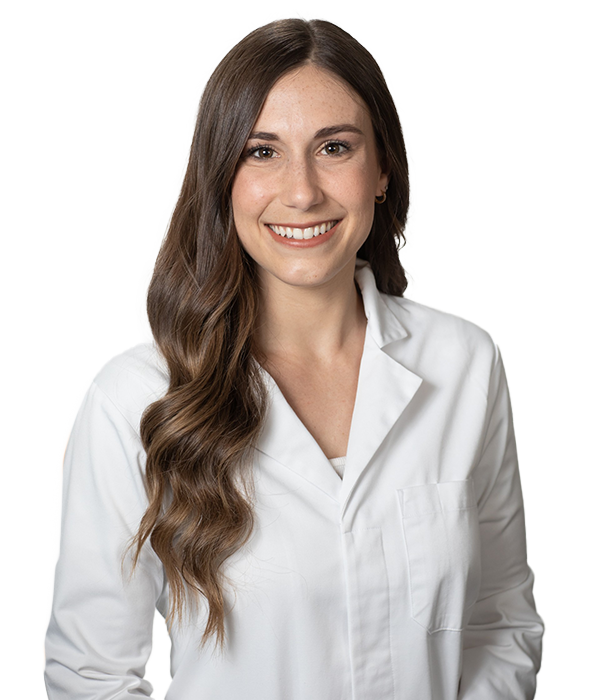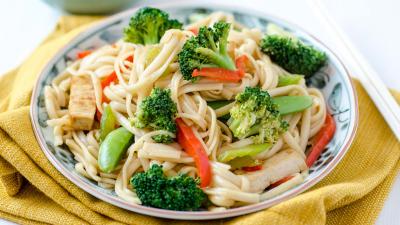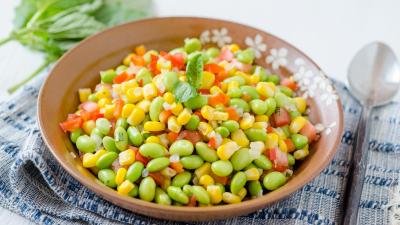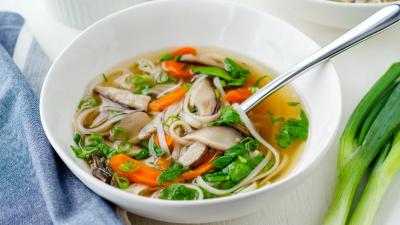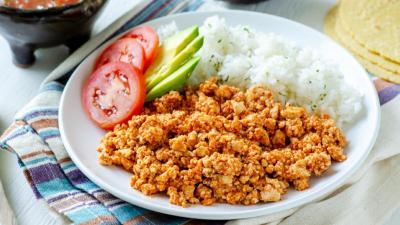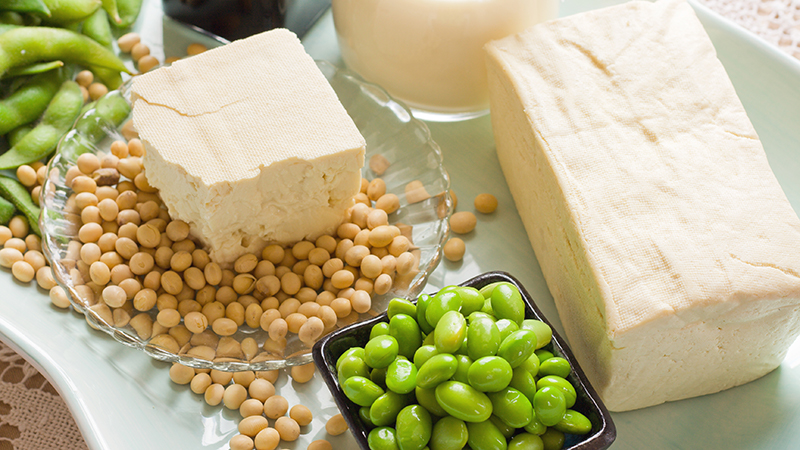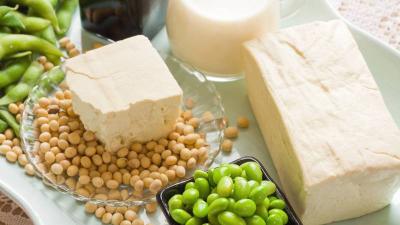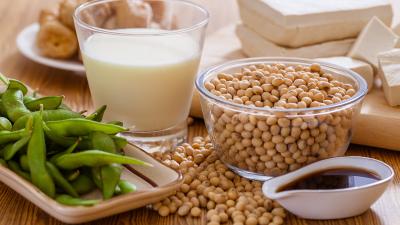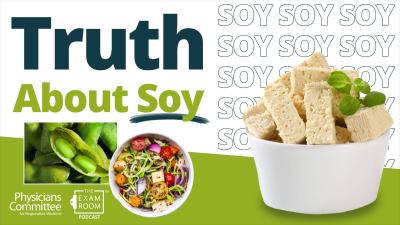Soy and Health
Soy products provide many health benefits.
Soy products offer a wide array of health benefits. Eating whole soy foods may reduce the risk of breast cancer and several other types of cancer, fibroids, and even inflammation. Soy is helpful for bone health, heart health, and menopausal symptoms.
Like most other plant foods, the healthiest soy foods are the least processed. Young soybeans, also called edamame, can be steamed and eaten right from their pods. Soybeans are also used to make other foods such as soy milk, tofu, tempeh, and miso, as well as soy meats and cheeses.
Yet while soy products have many health benefits, some people question their safety. Let’s look at what research shows.
Lower Risk of Breast Cancer
Research shows that women who consume soy are less likely to get breast cancer. One study found that women averaging 1 cup of soy milk or about half a cup of tofu daily have a 30% lower risk of developing breast cancer compared with women who eat little or no soy. This may be due in part to protective substances called isoflavones, a form of phytoestrogens, found in soy foods.1
In a 2013 meta-analysis that analyzed data from 22 studies, researchers found that, among Asian women, those who consumed the most isoflavones (compared with those who consumed the least) had a 32% lower risk of breast cancer.2 A protective effect was observed for both pre- and postmenopausal cancers. A 2014 meta-analysis reached similar conclusions.3 Western women don’t typically eat much soy, so it’s harder to compare between high and low levels of intake. However, eating soy foods during the preteen and teen years, when breast tissue is forming, may be especially protective.4-6
Lower Risk of Recurrence
What about women who have been diagnosed with breast cancer? Researchers found that women diagnosed with estrogen-negative breast cancer who ate the most soy isoflavones had a 21% lower risk of dying from cancer compared with those who ate the least.7
The Women’s Healthy Eating and Living Study also showed that soy may help protect breast cancer survivors. Researchers found that women who ate the most soy cut their risk of cancer coming back or cancer death in half.8 Another study followed 5,042 women previously diagnosed with breast cancer for four years. Women who regularly consumed soy products like soy milk, tofu, or edamame came out ahead.9 They were about a third less likely to have their cancer come back and 29% less likely to die from cancer compared with women who ate little soy. Numerous other studies confirm these findings. Women who avoid soy get no advantage, while women who consume soy are less likely to have their cancer return.8,10-15
How might soy help? Soy isoflavones may help keep estrogen signaling at healthy levels. Estrogens are female hormones made by women and, to a lesser extent, men. Estrogen works by binding to “docking sites,” or receptors, on cells. When estrogen binds to its receptor, it can trigger certain cancer cells to grow. However, your cells have two different kinds of estrogen receptors: alpha and beta. Estrone, the main estrogen in women after menopause, binds mainly to the alpha receptor. Soy isoflavones preferentially bind to beta receptors. This binding seems to help block the cell growth that’s part of the cancer process.
Protective Effects for Other Cancers
Soy foods may reduce the risk for other cancers, too, including colon, lung, endometrial, ovarian, and prostate.16-18
For example, the Shanghai Women’s Health Study examined the diets of 444 women diagnosed with lung cancer.18 After adjusting for outside factors, researchers found that patients who ate the most soy cut their chances of dying from the disease by nearly half. The same was found to be true in nonsmoking Japanese men.19
Hot Flashes
The Physicians Committee conducted a clinical trial called the WAVS trial (the Women’s study for the Alleviation of Vasomotor Symptoms).20 Postmenopausal women reporting two or more hot flashes per day were randomly assigned to either an intervention group—consisting of a low-fat, vegan diet, including half a cup of cooked soybeans daily—or to a control group that made no diet changes for 12 weeks.
In the intervention group, total hot flashes decreased by 79% and moderate-to-severe hot flashes decreased by 84%. At the study’s conclusion, 59% of intervention-group participants reported becoming free of moderate and severe hot flashes.
The reduction in hot flashes seen in this study is likely the result of the phytoestrogens in soy improving estrogen balance, in addition to the low-fat plant-based diet. Secondary analysis of this trial analyzed the stool samples of a subset of participants, and found that a decrease in certain gut bacteria, namely Porphyromonas and Prevotella corporis, resulting from the dietary change was also associated with the reduction in severe hot flashes.21
Hormones and Reproduction
Can soy affect reproductive health and fertility? Studies in both men and women have shown that soy has no effect.22-23 Moreover, no difference in reproductive health was seen among adults fed soy formula versus cow’s milk formula as infants.24
Soy also does not cause early puberty in girls. When researchers studied 327 young and adolescent girls, they found no relationship between soy consumption and younger age of puberty.25
Male Hormones
Soy products have no adverse effects on men. In fact, they may help prevent cancer. A meta-analysis showed that neither soy products nor soy isoflavone supplements affect testosterone levels in men.26 Another analysis of 14 studies showed that consuming more soy resulted in a 26% lower risk of prostate cancer, which is a hormone-related cancer.27 Yet another meta-analysis published in Nutrition and Cancer showed the same results for prostate cancer: a protective effect for men who eat tofu.28
Fibroids
Soy products may reduce the risk of fibroids in women. Fibroids are knots of muscle tissue that form within the thin muscle layer that lies beneath the uterine lining. A study of Japanese women found that the more soy they ate, the less likely they were to need surgery on their uterus.29 That result suggests that fibroids were less frequent.
In a study of women in the United States, soy did not seem to help or hurt.30 One possible reason is that American women eat little soy compared with their Japanese counterparts.31 What did have a big effect in this study were lignans—a type of phytoestrogen (estrogens found in plants) found in flaxseed and whole grains. Women who ate the most flaxseed and whole grains had less than half the risk of fibroids.
Thyroid Health
Clinical trials show that soy products do not affect the thyroid in healthy people.32-33 However, soy isoflavones may bind to iodine, which the body uses to make thyroid hormones. In theory, then, people who consume soy might need slightly more iodine in their diets. Iodine is found in many plant foods, and especially in sea vegetables (like the nori wrapper found on sushi) and iodized salt. Note that pink Himalayan salt and sea salt are not typically good sources of iodine. When using salt at home, iodized salt is best.
Other Health Benefits
Soy has been found to be anti-inflammatory. In the Shanghai Women’s Health Study, researchers looked at the diet of 1,005 middle-aged Chinese women.34 The more soy products the women consumed, the less inflammation they had. Inflammation is linked to cancer, type 2 diabetes, and heart disease.
Multiple studies have found that soy protein can reduce LDL cholesterol levels.35-36 Further, soy products are free from cholesterol and contain little or no artery-clogging saturated fat.37Eating soy and other plant proteins in place of animal protein can improve heart health.
Consuming soy may also reduce the risk of hip fracture from osteoporosis. In a study published in the American Journal of Epidemiology, women who ate at least a quarter-cup of tofu per day had a 30% lower risk of fracture.38 Another study followed 75,000 postmenopausal Chinese women for three years. Researchers found that those who ate the most soy foods had a 37% lower risk of suffering a bone fracture.39
Favor Whole Soy Foods
Foods made using whole soybeans like edamame, tofu, and soy milk have the most health benefits compared with more processed soy products. However, even highly processed forms of soy, such as soy protein isolate, used in soy-based meat and dairy alternatives offer more nutritional value compared with animal-based proteins.40 As much as possible, stick to simple soy products like tofu, tempeh, edamame, soy milk, or miso. These foods may help protect against cancer while providing health benefits.
Summary
Soy products offer a wide array of health benefits. Eating whole soy foods may reduce the risk of breast cancer and several other types of cancer, fibroids, and even inflammation. Soy is helpful for bone health, heart health, and menopausal symptoms. However, the benefits of soy appear to come from foods made from whole soy. Focus on tofu, tempeh, edamame, soy milk, and miso as part of a balanced, plant-based diet.
Plant-Based Prescription
Add 1 cup of soy milk or half a cup of tofu or edamame beans to your diet daily for the health benefits of phytoestrogens.
Phytoestrogens get a bad reputation because of the word estrogen. But the phytoestrogens in soy do not increase the risk of breast cancer, cause breasts to grow, or lead to infertility in men, and in fact have many health benefits.
Roxanne Becker, MBChB, DipIBLM, Medical Editor and Educator, Physicians Committee
Is Soy Healthy? Expert Reviews the Science
Researcher Mark Messina, PhD, joins "The Weight Loss Champion" Chuck Carroll to clear up the biggest myths surrounding soy!
Soy and Health
Recipes
Reap the health benefits of soy by trying some of our favorite recipes!
Learn More
DID YOU KNOW?
High dairy consumption increases overall mortality.
References
- Wu AH, Yu MC, Tseng CC, Pike MC. Epidemiology of soy exposures and breast cancer risk. Br J Cancer. 2008;98:9-14. doi:10.1038/sj.bjc.6604145
- Xie Q, Chen ML, Qin Y, et al. Isoflavone consumption and risk of breast cancer: a dose-response meta-analysis of observational studies. Asia Pac J Clin Nutr. 2013;22:118-127. doi:10.6133/apjcn.2013.22.1.16
- Chen M, Rao Y, Zheng Y, et al. Association between soy isoflavone intake and breast cancer risk for pre- and post-menopausal women: a meta-analysis of epidemiological studies. PLoS ONE. 2014;9:e89288-e89298. doi:10.1371/journal.pone.0089288
- Korde LA, Wu AH, Fears T, et al. Childhood soy intake and breast cancer risk in Asian American women. Cancer Epidemiol Biomarkers Prev. 2009;18:1050-1059. doi:10.1158/1055-9965.EPI-08-0405
- Shu XO, Jin F, Dai Q, et al. Soyfood intake during adolescence and subsequent risk of breast cancer among Chinese women. Cancer Epidemiol Biomarkers Prev. 2001;10(5):483-488.
- Lee SA, Shu XO, Li H, et al. Adolescent and adult soy food intake and breast cancer risk: results from the Shanghai Women's Health Study. Am J Clin Nutr. 2009;89(6):1920-1926. doi:10.3945/ajcn.2008.27361
- Zhang FF, Haslam DE, Terry MB, et al. Dietary isoflavone intake and all-cause mortality in breast cancer survivors: The Breast Cancer Family Registry. Cancer. 2017;123(11):2070-2079. doi:10.1002/cncr.30615
- Caan BJ, Natarajan L, Parker B, et al. Soy food consumption and breast cancer prognosis. Cancer Epidemiol Biomarkers Prev. 2011;20:854- 858. doi:10.1158/1055-9965.EPI-10-1041
- Shu XO, Zheng Y, Cai H, et al. Soy food intake and breast cancer survival. JAMA. 2009;302:2437-2443. doi:10.1001/jama.2009.1783
- Magee PJ, Rowland I. Soy products in the management of breast cancer. Curr Opin Clin Nutr Metab Care. 2012;15:586-591. doi:10.1097/MCO.0b013e328359156f
- Guha N, Kwan ML, Quesenberry CP Jr, Weltzien EK, Castillo AL, Caan BJ. Soy isoflavones and risk of cancer recurrence in a cohort of breast cancer survivors: The Life After Cancer Epidemiology study. Breast Cancer Res Treat. 2009;118:395-405. doi:10.1007/s10549-009-0321-5
- Nechuta SJ, Caan BJ, Chen WY, et al. Soy food intake after diagnosis of breast cancer and survival: an in-depth analysis of combined evidence from cohort studies of US and Chinese women. Am J Clin Nutr. 2012;96:123-132. doi:10.3945/ajcn.112.035972
- Messina MJ, Loprinzi CL. Soy for breast cancer survivors: a critical review of the literature. J Nutr. 2001;131(11 Suppl):3095S-3108S. doi:10.1093/jn/131.11.3095S
- Nechuta SJ, Caan BJ, Chen WY, et al. Soy food intake after diagnosis of breast cancer and survival: an in-depth analysis of combined evidence from cohort studies of US and Chinese women. Am J Clin Nutr. 2012;96:123-132. doi:10.3945/ajcn.112.035972
- Kang X, Zhang Q, Wang S, Huang X, Jin S. Effect of soy isoflavones on breast cancer recurrence and death for patients receiving adjuvant endocrine therapy. CMAJ. 2010;182:1857-1862. doi:10.1503/cmaj.091298
- Badger TM, Ronis MJ, Simmen RC, Simmen FA. Soy protein isolate and protection against cancer. J Am Coll Nutr. 2005;24:146S-149S. doi:10.1080/07315724.2005.10719456
- Yang G, Shu XO, Li HL, et al. Prediagnosis soy food consumption and lung cancer survival in women. J Clin Oncol. 2013;31:1548-1553. doi:10.1200/JCO.2012.43.0942
- Myung SK, Ju W, Choi HJ, Kim SC; Korean Meta-Analysis (KORMA) Study Group. Soy intake and risk of endocrine-related gynaecological cancer: a meta-analysis. BJOG. 2009;116:1697-1705. doi:10.1111/j.1471-0528.2009.02322.x
- Schimazu T, Inoue M, Sasazuki S, et al. Isoflavone intake and risk of lung cancer: a prospective cohort study in Japan. Am J Clin Nutr. 2010;91:722-728. doi:10.3945/ajcn.2009.28161
- Barnard ND, Kahleova H, Holtz DN, et al. A dietary intervention for vasomotor symptoms of menopause: a randomized, controlled trial. Menopause. 2023;30(1):80-87. doi:10.1097/GME.0000000000002080
- Kahleova H, Holtz DN, Strom N, et al. A dietary intervention for postmenopausal hot flashes: a potential role of gut microbiome. An exploratory analysis. Complement Ther Med. 2023;79:103002. doi:10.1016/j.ctim.2023.103002
- Mitchell JH, Cawood E, Kinniburgh D, Provan A, Collins AR, Irvine DS. Effect of a phytoestrogen food supplement on reproductive health in normal males. Clin Sci (Lond). 2001;100:613-618.
- Kurzer MS. Hormonal effects of soy in premenopausal women and men. J Nutr. 2002;132:570S-573S. doi:10.1093/jn/132.3.570S
- Strom BL, Schinnar R, Ziegler EE, et al. Exposure to soy-based formula in infancy and endocrinological and reproductive outcomes in young adulthood. JAMA. 2001;286:807-814. doi:10.1001/jama.286.7.807
- Segovia-Siapco G, Pribis P, Messina M, Oda K, Sabaté J. Is soy intake related to age at onset of menarche? A cross-sectional study among adolescents with a wide range of soy food consumption. Nutr J. 2014;13:54-63. doi:10.1186/1475-2891-13-54
- Hamilton-Reeves JM, Vazquez G, Duval SJ, Phipps WR, Kurzer MS, Messina MJ. Clinical studies show no effects of soy protein or isoflavones on reproductive hormones in men: results of a meta-analysis. Fertil Steril. 2010;94:997-1007. doi:10.1016/j.fertnstert.2009.04.038
- Yan L, Spitznagel EL. Soy consumption and prostate cancer risk in men: a revisit of a meta-analysis. Am J Clin Nutr. 2009;89:1155-1163. doi:10.3945/ajcn.2008.27029
- Hwang YW, Kim SY, Jee SH, Kim YN, Nam CM. Soy food consumption and risk of prostate cancer: a meta-analysis of observational studies. Nutr Cancer. 2009;61:598-606. doi:10.1080/01635580902825639
- Nagata C, Takatsuka N, Kawakami N, Shimizu H. Soy product intake and premenopausal hysterectomy in a follow-up study of Japanese women. Eur J Clin Nutr. 2001;55:773-777. doi:10.1038/sj.ejcn.1601223
- Atkinson C, Lampe JW, Scholes D, Chen C, Wähälä K, Schwartz SM. Lignan and isoflavone excretion in relation to uterine fibroids: a case-control study of young to middle-aged women in the United States. Am J Clin Nutr. 2006;84(3):587-93. doi:10.1093/ajcn/84.3.587
- Atkinson C, Lampe JW, Scholes D, Chen C, Wahala K, Schwartz SM. Lignan and isoflavone excretion in relation to uterine fibroids: a case-control study of young to middle-aged women in the United States. Am J Clin Nutr. 2006;84:587-593. doi:10.1093/ajcn/84.3.587
- Messina M, Redmond G. Effects of soy protein and soybean isoflavones on thyroid function in healthy adults and hypothyroid patients: a review of the relevant literature. Thyroid. 2006;16:249-258. doi:10.1089/thy.2006.16.249
- Divi RL, Chang HC, Doerge DR. Anti-thyroid isoflavones from soybean: Isolation, characterization, and mechanisms of action. Biochem Pharmacol. 1997;54:1087-1096. doi:10.1016/s0006-2952(97)00301-8
- Wu SH, Shu XO, Chow WH, et al. Soy food intake and circulating levels of inflammatory markers in Chinese Women. J Acad Nutr Diet. 2012;112:996-1004. doi:10.1016/j.jand.2012.04.001
- Taku K, Umegaki K, Sato Y, Taki Y, Endoh K, Watanabe S. Soy isoflavones lower serum total and LDL cholesterol in humans: a meta-analysis of 11 randomized controlled trials [published correction appears in Am J Clin Nutr. 2007 Sep;86(3):809]. Am J Clin Nutr. 2007;85(4):1148-1156. doi:10.1093/ajcn/85.4.1148
- Zhan S, Ho SC. Meta-analysis of the effects of soy protein containing isoflavones on the lipid profile. Am J Clin Nutr. 2005;81(2):397-408. doi:10.1093/ajcn.81.2.397
- Li SS, Blanco Mejia S, Lytvyn L, et al. Effect of plant protein on blood lipids: a systematic review and meta-analysis of randomized controlled trials. J Am Heart Assoc. 2017;6:E1-E51. doi:10.1161/JAHA.117.006659
- Koh WP, Wu AH, Wang R, et al. Gender-specific associations between soy and risk of hip fracture in the Singapore Chinese Health Study. Am J Epidemiol. 2009;170:901-909. doi:10.1093/aje/kwp220
- Zhang X, Shu XO, Li H, et al. Prospective cohort study of soy food consumption and risk of bone fracture among postmenopausal women. Arch Intern Med. 2005;165:1890-1895. doi:10.1001/archinte.165.16.1890
- Messina M, Sievenpiper JL, Williamson P, Kiel J, Erdman JW. Perspective: soy-based meat and dairy alternatives, despite classification as ultra-processed foods, deliver high-quality nutrition on par with unprocessed or minimally processed animal-based counterparts. Adv Nutr. 2022;13(3):726-738. doi:10.1093/advances/nmac026
